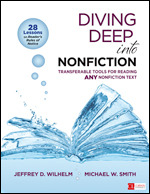Diving Deep Into Nonfiction, Grades 6-12
Transferable Tools for Reading ANY Nonfiction Text
- Jeffrey D. Wilhelm - Boise State University, Idaho
- Michael W. Smith - Temple University, USA
Corwin Literacy
“General reading strategies and teacher-developed questions will only take our students so far—with our approach, students gain astounding independence because they engage directly with the nonfiction author, and with how that author used specific details (moves) and structures to communicate meanings and effects.”
—Wilhelm and Smith
All nonfiction is a conversation between the writer and the reader, an invitation to agree or disagree with compelling and often provocative ideas about some aspect of the world we live in. At the end of the day, it’s our responsibility to decide if the argument is sound. With Diving Deep Into Nonfiction, Jeffrey D. Wilhelm and Michael W. Smith deliver a revolutionary teaching framework that helps students read well by noticing the rules and conventions of this dynamic exchange.
The classroom-tested lessons include engaging short excerpts and teach students to be powerful readers who know both how authors signal what’s worth noticing in a text and how readers connect and make meaning of what they have noticed.
No matter what they are reading, students learn to be on high alert, and highly curious about how texts work and what they mean, as they learn to notice direct statements of principle, calls to attention, ruptures, and readers’ rules of notice:
- Notice the topics and the textual conversation: Who is speaking and how might he or she be responding to another’s ideas? What is the idea that gives “heat” to this text?
- Notice key details: What attracts my attention? How does the author signal both direct and implicit statements of meaning? How does the author use the unexpected? How can I interpret patterns of key details to see overall meanings?
- Notice varied nonfiction genres: What are the essential features of this kind of text? How does the author employ them? What effects are they designed to have on the reader?
- Notice text structure: How does the author structure the text to connect details and ideas? What patterns of thought does the author use along the way?
With Diving Deep Into Nonfiction, Wilhelm and Smith upend current practices, and it’s high time. Once your students engage with these lessons, you’ll never go back to the same old tired approach— and reading across content areas enters a whole new era.

